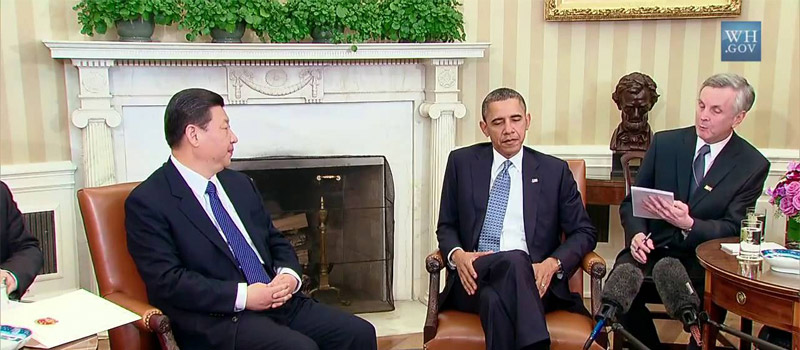
Interpreters, who help bridge the language gap in presidential meetings, serve as confidants, fact-checkers, and de facto diplomats.
The following article was published by David A. Graham, a staff writer at The Atlantic. Excel Translations does not endorse, recommend, or make representations with respect to its content.
In any meeting with a foreign leader, the usually anonymous figures who facilitate communication aren’t just there to mechanically transfer words between languages. Interpreters can also function as failsafes, fact-checkers, and even as confidants—especially for inexperienced presidents like Trump.
“When you come in as a new president, you’re sometimes dealing with a leader who’s been in office for 10 or 20 years, who has been visited by other American presidents before,” says Harry Obst, who translated for seven U.S. presidents. Obst, a German native who eventually led the State Department’s Office of Language Services.
The interpreters, however, are career State Department staffers, who often bring years of experience to a summit. Obst said that Lyndon Johnson, who ascended to the presidency suddenly when John F. Kennedy was killed, was particularly eager to tap interpreters’ wisdom.
“Johnson would caucus with me before the meeting, and he would say, ‘Look, do you know this person? What is he like? Is he devious? Is he straightforward? Is it best to raise a subject straight on or fish around it a bit?’” Obst says.
By the time an interpreter gets into a room with the president and a foreign leader, he or she brings in more than simply past meetings. The first, essential foundation is a wide range of general knowledge. White House interpreters are provided by the Office of Language Services, which tests would-be interpreters on general knowledge.
“To work at the very top, you have to have an incredible arsenal of general knowledge, because the president will get into every damn topic you can imagine, from nuclear submarines to agriculture to treaty problems to labor problems to God knows what, jellyfish in the sea,” Obst says. “If you don’t know how an airplane flies, if you don’t know how a nuclear reactor works, you’re going to make mistakes.”
Like anyone else in a sensitive meeting, an interpreter must have high security clearance. He or she will also have received all the same briefing books as the president. That’s essential so that the interpreter can understand the nuances of the information discussed and knows the vocabulary. But it also means that the interpreter can serve as a crutch for the president, catching minor factual errors or slips of the tongue.
“If you don’t know how an airplane flies, if you don’t know how a nuclear reactor works, you’re going to make mistakes.”
Once in the meeting, typical protocol calls for a principal to speak, followed by an interpretation by his or her interpreter—so, for example, Trump would speak, and then his interpreter would pronounce what he said in Russian. That helps insulate the principal from factual errors, but it also helps avoid problems of idioms lost in translation. American presidents might be tempted to discuss “punting,” a football metaphor that would make little sense to a non-native English speaker; likewise, a European leader who referred to the “89th minute,” as in the final moments of a soccer game, would only confuse an American counterpart.
“The interpreter will help the principal if he wants to be helped,” Obst says. “Usually you say, ‘Mr. Secretary, did you really mean to say such and such?’ Then he has a chance to correct himself. ”
A figure like Trump, who sometimes mangles the English language and offers his own array of peculiar phrasings and usages (sad! bigly!) can present a different set of challenges for an interpreter.
“People misspeak, and some very frequently, people like Alexander Haig,” Obst said, referring to the retired general who was chief of staff to Richard Nixon and secretary of state to Ronald Reagan. “He had a very crazy knowledge of the English language. He would not say what he really meant to say.”
Not that interpreters are immune to making their own errors. Obst began working as an interpreter after just six months of training, and was helped out by the kindness of his more experienced counterparts.
“If I would make a minor mistake, they would just not react at all, because it was not important. If I would make a serious substantive mistake, they would stare at me and raise their eyebrows: Harry, you’ve just made a bad mistake. They give you a chance to look back into your memory and correct it yourself. If you can’t, you look back at them and shrug you shoulders: Help me!”
But Obst said he was lucky enough to avoid serious errors in his career. Interpreters who make a major gaffe tend to be quickly dismissed, he said. Others become the story in other ways: Fred Burks was a talented linguist who resigned over complaints about secrecy in the Bush administration; he later testified on behalf of an accused terrorist in Indonesia, and now contributes to a conspiracy-theory website. Those who stick around end up being the witnesses—though sworn to secrecy—to pivotal moments of history, like Gamal Helal, an Egyptian-born American who interpreted decades of Middle Eastern diplomacy between Arabic and English.
Interpreters also serve an essential role as record-keepers, taking notes that end up in the National Archives, Obst said. Of course, interpreters are not always asked to take notes.
The idea of limiting meeting sizes in order to control information tightly is not entirely new. Obst recalls that Nixon and Henry Kissinger, who distrusted the State Department and had a rocky relationship with Secretary William Rogers, sometimes kept U.S. interpreters out of meetings, for fear that they would brief Rogers on what had been discussed. (This also meant that Obst sometimes found himself assisting Rogers in conversations with foreign leaders on topics about which the White House had kept him in the dark.)
Leave a Reply